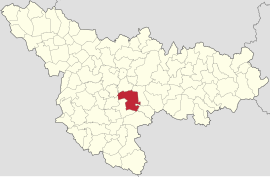Sacoșu Turcesc
Sacoșu Turcesc | |
|---|---|
 Location in Timiș County | |
| Coordinates: 45°39′N 21°26′E / 45.650°N 21.433°E | |
| Country | Romania |
| County | Timiș |
| Government | |
| • Mayor (2020–2024) | Gabriel Koller[1] (PNL) |
| Area | 124.53 km2 (48.08 sq mi) |
| Population (2021-12-01)[3] | 3,392 |
| • Density | 27/km2 (71/sq mi) |
| Time zone | EET/EEST (UTC+2/+3) |
| Postal code | 307355–307362 |
| Vehicle reg. | TM |
| Website | primariasacos |
Sacoșu Turcesc (Hungarian: Törökszákos; German: Türkisch Sakosch)[4] is a commune in Timiș County, Romania. It is composed of seven villages: Berini, Icloda, Otvești, Sacoșu Turcesc (commune seat), Stamora Română, Uliuc and Unip.
Name
[edit]| Romanian | Hungarian | German |
|---|---|---|
| Berini | Temesberény | Berin |
| Icloda | Iklód | Ikloda |
| Otvești | Ötvösd or Eötvösfalva | Ötwösch |
| Sacoșu Turcesc | Törökszákos | Türkisch Sakosch |
| Stamora Română | Felsősztamora or Oláhsztamora | Wallachisch Stamora |
| Uliuc | Temesújlak | Uliuk |
| Unip | Temesújnép | Unipp |
History
[edit]The first recorded mention of Sacoșu Turcesc dates from 1321, when, in a Hungarian noble diploma, the village of Zekes, belonging to Szörény County, is mentioned.[5] Also here is attested from 1440 a castle, which belonged to the Hungarian noble family Kórógy. In 1459 the castle came into the possession of the Hungarian king Matthias Corvinus, and then he ceded it to the Hungarian noble family Kanizsa. In 1473 the castle was owned by Ioan Ungur of Nădăștia and the Szobi family. From 1507, the ownership of the castle is taken over by István Werbőczy.[6]
The word Turcesc ("Turkish") in the name of the locality does not indicate, as it seemed at first sight, the ethnicity of the villagers, but the Ottoman suzerainty under which the locality was at one time. This is to distinguish it from Sacoșu Mare, which was also called Sacoșu Unguresc, because it was in the part of Banat attached to Transylvania during the time of Temeşvar Eyalet.
The Franciscan monastery here, founded by King Charles Robert in 1366, was destroyed during the Ottoman occupation.[7]
Demographics
[edit]Ethnic composition (2011)[8]
Religious composition (2011)[9]
Sacoșu Turcesc had a population of 3,307 inhabitants at the 2011 census, up 5% from the 2002 census. Most inhabitants are Romanians (79.59%), larger minorities being represented by Hungarians (7.32%) and Roma (4.93%). For 7.53% of the population, ethnicity is unknown.[8] By religion, most inhabitants are Orthodox (80.44%), but there are also minorities of Roman Catholics (6.5%), Pentecostals (2.12%) and Reformed (1.39%). For 7.68% of the population, religious affiliation is unknown.[9]
| Census[10] | Ethnic composition | |||||
|---|---|---|---|---|---|---|
| Year | Population | Romanians | Hungarians | Germans | Roma | Serbs |
| 1880 | 5,301 | 4,675 | 451 | 148 | – | 13 |
| 1890 | 6,003 | 5,106 | 675 | 186 | – | 21 |
| 1900 | 6,611 | 5,437 | 872 | 240 | – | 40 |
| 1910 | 6,739 | 5,331 | 1,131 | 191 | – | 24 |
| 1920 | 5,832 | 4,838 | 763 | 166 | – | – |
| 1930 | 5,771 | 4,859 | 676 | 158 | 38 | 12 |
| 1941 | 5,554 | 4,607 | 637 | 174 | – | – |
| 1956 | 5,229 | 4,424 | 615 | 88 | 76 | 6 |
| 1966 | 4,781 | 4,040 | 455 | 47 | 37 | 191 |
| 1977 | 4,658 | 3,984 | 436 | 44 | 185 | – |
| 1992 | 3,037 | 2,626 | 230 | 30 | 144 | 2 |
| 2002 | 3,156 | 2,686 | 215 | 21 | 223 | 2 |
| 2011 | 3,307 | 2,632 | 242 | 12 | 163 | – |
References
[edit]- ^ "Results of the 2020 local elections". Central Electoral Bureau. Retrieved 16 June 2021.
- ^ "Primăria Sacoșu Turcesc". Ghidul Primăriilor.
- ^ "Populaţia rezidentă după grupa de vârstă, pe județe și municipii, orașe, comune, la 1 decembrie 2021" (XLS). National Institute of Statistics.
- ^ von Thiele, J. C. (1833). Das Königreich Ungarn: Ein topographisch-historisch-statistisches Rundgemälde. Vol. VI. Košice: v. Thiele. p. 330.
- ^ Szabó, M. Attila (2003). Erdély, Bánság és Partium történeti és közigazgatási helységnévtára. Miercurea Ciuc: Pro-Print Kiadó.
- ^ Koppány, Tibor (1999). A középkori Magyarország kastélyai. Budapest: Akadémiai Kiadó. ISBN 963-05-7694-5.
- ^ Rusu, Adrian Andrei (2000). Dicționarul mănăstirilor. Presa Universitară Clujeană. p. 220.
- ^ a b "Tab8. Populația stabilă după etnie – județe, municipii, orașe, comune". Institutul Național de Statistică.
- ^ a b "Tab13. Populația stabilă după religie – județe, municipii, orașe, comune". Institutul Național de Statistică.
- ^ Varga, E. Árpád. "Temes megye településeinek etnikai (anyanyelvi/nemzetiségi) adatai 1880-2002" (PDF).


 French
French Deutsch
Deutsch
